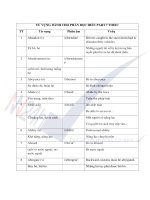TỪ VỰNG TOEIC unit 2
Bạn đang xem bản rút gọn của tài liệu. Xem và tải ngay bản đầy đủ của tài liệu tại đây (256.01 KB, 60 trang )
Unit 2
MANIA PSYCH CEPT FIN JECT TRACT DUC/DUCT SEQU Words from
Mythology
Quiz 2-1 Quiz 2-2 Quiz 2-3 Quiz 2-4 Quiz 2-5 Review Quizzes 2
MANIA in Latin means “madness,” and the meaning passed over into
English unchanged. Our word mania can mean a mental illness, or at least an
excessive enthusiasm. We might call someone a maniac who was wild,
violent, and mentally ill—or maybe just really enthusiastic about something.
Too much caffeine might make you a bit manic. But the intense mood swings
once known as manic-depressive illness are now usually called bipolar
disorder instead.
kleptomania
strong desire to steal things.
A mental illness in which a person has a
• Kleptomania leads its sufferers to steal items of little value that they don't
need anyway.
Klepto- comes from the Greek word kleptein, “to steal.” Even though
kleptomania is often the butt of jokes, it's actually a serious mental illness,
often associated with mood disorders, anxiety disorders, eating disorders, and
substance abuse. Klepotomaniacs tend to be depressed, and many live lives of
secret shame because they're afraid to seek treatment.
dipsomaniac
uncontrollable desire for alcohol.
A person with an extreme and
• She didn't like the word alcoholic being applied to her, and liked
dipsomaniac even less.
Dipsomaniac comes from the Greek noun dipsa, “thirst,” but thirst usually
has nothing to do with it. Some experts distinguish between an alcoholic and
a dipsomaniac, reserving dipsomaniac for someone involved in frequent
episodes of binge drinking and blackouts. In any case, there are plenty of less
respectful words for a person of similar habits: sot, lush, wino, souse, boozer,
guzzler, tippler, tosspot, drunkard, boozehound--the list goes on and on and
on.
megalomaniac
A mental disorder marked by
feelings of great personal power and importance.
• When the governor started calling for arming his National Guard with
nuclear weapons, the voters finally realized they had elected a megalomaniac.
Since the Greek root megalo- means “large,” someone who is
megalomaniacal has a mental disorder marked by feelings of personal
grandeur. Megalomania has probably afflicted many rulers throughout
history: The Roman emperor Caligula insisted that he be worshipped as a
living god. Joseph Stalin suffered from the paranoia that often accompanies
megalomania, and had thousands of his countrymen executed as a result. J.B. Bokassa, dictator of a small and extremely poor African nation,
proclaimed himself emperor of the country he renamed the Central African
Empire. And even democratically elected leaders have often acquired huge
egos as a result of public acclaim. But megalomaniac is generally thrown
around as an insult and rarely refers to real mental illness.
egomaniac
Someone who is extremely self-centered
and ignores the problems and concerns of others.
• He's a completely unimpressive person, but that doesn't keep him from
being an egomaniac.
Ego is Latin for “I,” and in English ego usually means “sense of self-worth.”
Most people's egos stay at a healthy level, but some become exaggerated.
Egomaniacs may display a grandiose sense of self-importance, with fantasies
about their own brilliance or beauty, intense envy of others, a lack of
sympathy, and a need to be adored or feared. But, like megalomaniac, the
word egomaniac is thrown around by lots of people who don't mean much
more by it than blowhard or know-it-all.
PSYCH comes from the Greek word psyche, meaning “breath, life, soul.”
Psychology is the science of mind and behavior, and a psychologist treats or
studies the mental problems of individuals and groups. Psychiatry is a branch
of medicine that deals with mental and emotional disorders, and a
psychiatrist (like any other doctor) may prescribe drugs to treat them.
psyche
Soul, personality, mind.
• Analysts are constantly trying to understand the nation's psyche and why the
U.S. often behaves so differently from other countries.
Sometime back in the 16th century, we borrowed the word psyche directly
from Greek into English. In Greek mythology, Psyche was a beautiful
princess who fell in love with Eros (Cupid), god of love, and went through
terrible trials before being allowed to marry him. The story is often
understood to be about the soul redeeming itself through love. (To the
Greeks, psyche also meant “butterfly,” which suggests how they imagined the
soul.) In English, psyche often sounds less spiritual than soul, less intellectual
than mind, and more private than personality.
psychedelic
(1) Of or relating to a drug (such as LSD) that
produces abnormal and often extreme mental effects such as hallucinations.
(2) Imitating the effects of psychedelic drugs.
• In her only psychedelic experience, back in 1970, she had watched with
horror as the walls began crawling with bizarrely colored creatures.
The most famous—or notorious—of the psychedelic drugs is LSD, a
compound that can be obtained from various mushrooms and other fungi but
is usually created in the lab. The other well-known psychedelics are
psilocybin (likewise obtained from fungi) and mescaline (obtained from
peyote cactus). How psychedelics produce their effects is still fairly
mysterious, partly because research ceased for almost 20 years because of
their reputation, but scientists are determined to find the answers and much
research is now under way. Psychedelics are now used to treat anxiety in
patients with cancer, and are being tested in the treatment of such serious
conditions as severe depression, alcoholism, and drug addiction.
psychosomatic
Caused by mental or emotional
problems rather than by physical illness.
• Her doctor assumed her stomach problems were psychosomatic but gave
her some harmless medication anyway.
Since the Greek word soma means “body,” psychosomatic suggests the link
between mind and body. Since one's mental state may have an important
effect on one's physical state, research on new medicines always involves
giving some patients in the experiment a placebo (fake medicine), and some
who receive the sugar pills will seem to improve. You may hear someone say
of someone else's symptoms, “Oh, it's probably just psychosomatic,”
implying that the physical pain or illness is imaginary—maybe just an
attempt to get sympathy—and that the person could will it away if he or she
wanted to. But this can be harsh and unfair, since, whatever the cause is, the
pain is usually real.
psychotherapist
One who treats mental or emotional
disorder or related bodily ills by psychological means.
• He's getting medication from a psychiatrist, but it's his sessions with the
psychotherapist that he really values.
Many psychologists offer psychological counseling, and psychological
counseling can usually be called psychotherapy, so many psychologists can
be called psychotherapists. The most intense form of psychotherapy, called
psychoanalysis, usually requires several visits a week. A competing type of
therapy known as behavior therapy focuses on changing a person's behavior
(often some individual habit such as stuttering, tics, or phobias) without
looking very deeply into his or her mental state.
Quiz 2-1
A. Fill in each blank with the correct letter:
a. psychedelic b. kleptomania c. psyche d. egomaniac e. megalomaniac f.
psychosomatic g. dipsomaniac h. psychotherapist
1. Her boss was an ___ who always needed someone around telling him how
brilliant he was. 2. Testing ___ drugs on cancer patients was difficult because
of their unpredictable mental effects. 3. By now the dictator had begun to
strike some observers as a possibly dangerous ___.
4. His fear of AIDS was so intense that he'd been developing ___ symptoms,
which his doctor hardly bothered to check out anymore.
5. After finding several of her missing things in the other closet, she began
wondering if her roommate was an ordinary thief or actually suffering from
___.
6. They'd only been together two weeks, but already she suspected there was
a lot hidden in the depths of her boyfriend's ___.
7. A medical report from 1910 had identified her great-grandfather as a ___,
and ten years later his alcoholism would kill him.
8. He hated the thought of drugs but knew he needed someone to talk to, so
his brother recommended a local ___.
Answers
B. Match each word on the left to the best definition on the right:
1. psyche
a. alcoholic
2. egomaniac
b. caused by the mind
3. psychotherapist c. person deluded by thoughts of grandeur
4. psychosomatic d. producing hallucinations
5. dipsomaniac e. compulsive thieving
6. megalomaniac f. mind
7. kleptomania
g. extremely self-centered person
8. psychedelic
h. “talk” doctor
Answers
CEPT comes from the Latin verb meaning “take, seize.” Capture, which is
what a captor has done to a captive, has the same meaning. Captivate once
meant literally “capture,” but now means only to capture mentally through
charm or appeal. But in some other English words this root produces, such as
those below, its meaning is harder to find.
reception
(1) The act of receiving. (2) A social gathering
where guests are formally welcomed.
• Although the reception of her plan by the board of directors was
enthusiastic, it was months before anything was done about it.
Reception is the noun form of receive. So at a formal reception, guests are
received or welcomed or “taken in.” A bad TV reception means the signal
isn't being received well. When a new novel receives good reviews, we say it
has met with a good critical reception. If it gets a poor reception, on the other
hand, that's the same as saying that it wasn't well-received.
intercept
before arrival.
To stop, seize, or interrupt (something or someone)
• The explosives had been intercepted by police just before being loaded onto
the jet.
Since the prefix inter means “between” (see INTER), it's not hard to see how
intercept was created. Arms shipments coming to a country are sometimes
intercepted, but such interceptions can sometimes be understood as acts of
war. In football, soccer, and basketball, players try to intercept the ball as it's
being passed by the other team. In years gone by, letters and documents being
carried between officers or officials were sometimes intercepted when the
carrier was caught; today, when these communications are generally
electronic, an intercepted e-mail isn't actually stopped, but simply read
secretly by a third party.
perceptible
Noticeable or able to be felt by the senses.
• Her change in attitude toward him was barely perceptible, and he couldn't
be sure he wasn't just imagining it.
Perceptible includes the prefix per-, meaning “through,” so the word refers to
whatever can be taken in through the senses. A perceptive person picks up
minor changes, small clues, or hints and shades of meaning that others can't
perceive, so one person's perception—a tiny sound, a slight change in the
weather, a different tone of voice—often won't be perceptible to another.
susceptible
(1) Open to some influence; responsive. (2)
Able to be submitted to an action or process.
• She impressed everyone immediately with her intelligence, so they're now
highly susceptible to her influence and usually go along with anything she
proposes.
With its prefix sus-, “up,” susceptible refers to something or someone that
“takes up” or absorbs like a sponge. A sickly child may be susceptible to
colds, and an unlucky adult may be susceptible to back problems. A lonely
elderly person may be susceptible to what a con man tells him or her on the
phone. And students are usually susceptible to the teaching of an imaginative
professor—that is, likely to enjoy and learn from it.
FIN comes from the Latin word for “end” or “boundary.” Final describes last
things, and a finale or a finish is an ending. (And at the end of a French film,
you may just see the word “Fin.”) But its meaning is harder to trace in some
of the other English words derived from it.
confine
(1) To keep (someone or something) within limits. (2) To
hold (someone) in a location.
• He had heard the bad news from the CEO, but when he spoke to his
employees he confined his remarks to a few hints that sales had slipped.
Confine means basically to keep someone or something within borders.
Someone confined to a bedroom or a wheelchair is too ill or disabled to be
anywhere else. A person under “house arrest” is confined to his or her house
by the government. At a business meeting, the discussion may be confined to
a single topic. A town may keep industrial development confined to one area
by means of zoning. And someone confined to the state prison for 20 years
has probably committed quite a serious crime.
definitive
or precisely.
(1) Authoritative and final. (2) Specifying perfectly
• The team's brilliant research provided a definitive description of the virus
and its strange mutation patterns.
Something definitive is complete and final. A definitive example is the
perfect example. A definitive answer is usually a strong yes or no. A
definitive biography contains everything we'll ever need to know about
someone. Ella Fitzgerald's famous 1950s recordings of American songs have
even been called definitive—but no one ever wanted them to be the last.
finite
Having definite limits.
• Her ambitions were infinite, but her wealth was finite.
It has come as a shock to many of us to realize that resources such as oil—
and the atmosphere's ability to absorb greenhouse gases—are finite rather
than unlimited. The debate continues as to whether the universe is finite or
infinite and, if it's finite, how to think about what lies beyond it. Religion has
always concerned itself with the question of the finite (that is, human life on
earth) versus the infinite (God, eternity, and infinity). But finite is mostly
used in scientific writing, often with the meaning “definitely measurable.”
infinitesimal
Extremely or immeasurably small.
• Looking more closely at the research data, he now saw an odd pattern of
changes so infinitesimal that they hadn't been noticed before.
Just as infinite describes something immeasurable (“without limit”),
infinitesimal describes something endlessly small. When Antonie van
Leeuwenhoek invented the microscope in the 17th century, he was able to see
organisms that had been thought too infinitesimally small to exist. But today's
electron microscope allows us to see infinitesimal aspects of matter that even
Leeuwenhoek could not have imagined.
Quiz 2-2
A. Fill in each blank with the correct letter:
a. confine
b. susceptible
c. definitive
d. reception
e. finite
f. intercept
g. infinitesimal
h. perceptible
1. By the fall there had been a ___ change in the mood of the students.
2. An ___ speck of dust on the lens can keep a CD player from functioning.
3. They waited weeks to hear about the board's ___ of their proposal.
4. Let's ___ this discussion to just the first part of the proposal.
5. Small children are often ___ to nightmares after hearing ghost stories in
the dark.
6. He was at the post office the next morning, hoping to ___ the foolish letter
he had sent yesterday.
7. We have a ___ number of choices, in fact maybe only three or four.
8. This may be the best book on the subject so far, but I wouldn't call it ___.
Answers
B. Match the word on the left to the correct definition on the right:
1. confine
a. noticeable
2. susceptible b. ultimate
3. definitive c. seize
4. reception
d. easily influenced
5. finite
e. tiny
6. intercept
f. limit
7. infinitesimal g. receiving
8. perceptible h. limited
Answers
JECT comes from jacere, the Latin verb meaning “throw” or “hurl.” To
reject something is to throw (or push) it back; to eject something is to throw
(or drive) it out; and to inject something is to throw (or squirt) it into
something else.









